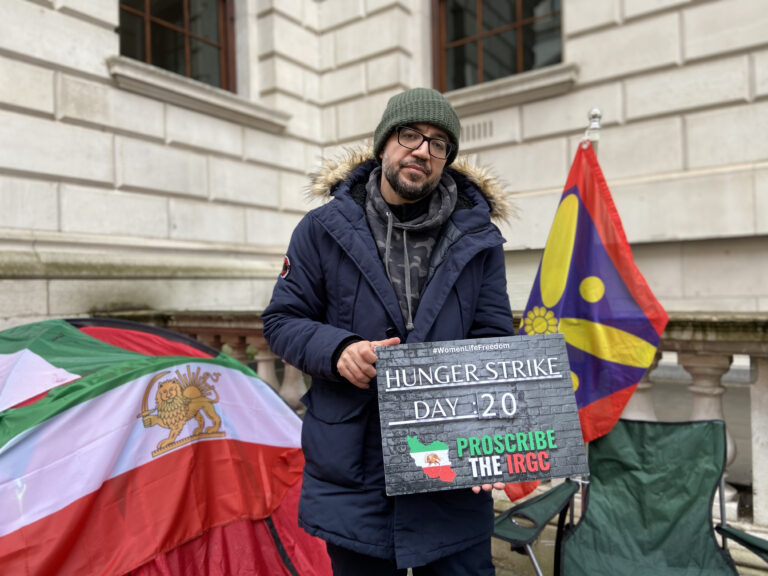A British-Iranian man who has been on hunger strike outside the Foreign Office in London for 43 days has said he is prepared to continue his protest for 100 days.
Vahid Beheshti, who has lost more than 13kg of weight since starting his protest in late February, is demanding the government add the Islamic Revolutionary Guards Corp to the UK’s list of terrorist organisations. That is a policy the government appeared to be close to adopting earlier this year, but it has yet to press ahead with it.
“I don’t know how long my physical body can cooperate with me. I meditate a lot and that gives me focus,” said Beheshti on a damp London day on April 6. “I don’t know how long I can keep going. My doctor is constantly checking me. He is worried about my weight.”
Beheshti held a meeting with security minister Tom Tugendhat on March 27, but has yet to hear anything from Prime Minister Rishi Sunak
In August last year, Sunak said in response to a violent attack on celebrated novelist Salman Rushdie in Chautauqua, New York that “The brutal stabbing of Salman Rushdie should be a wake-up call for the West, and Iran’s reaction to the attack strengthens the case for proscribing the IRGC.”
At the time Sunak was campaigning to become leader of the Conservative Party and prime minister. Since winning office in October, however, he has made no further public comments on the issue.
Beheshti is calling on the prime minister to follow up on his earlier statement. “If he doesn’t have energy and motivation to come and see me, after 43 days of hunger strike I still have energy and motivation to go and see him,” he said from his roadside tent.
10 Downing Street declined to say if Sunak was willing to meet with Beheshti or if the prime minister thought there was still a strong case for proscribing the IRGC. A government spokesperson said “We do not comment on whether a specific organisation is or is not being considered for proscription.”
Under the Terrorism Act 2000, the home secretary can proscribe an organisation if they believe it participates in terrorist acts, promotes or glorifies terrorism or is otherwise involved in terrorism. They also need to view such a designation as proportionate. To date, some 78 organisations have been proscribed under the act.
Tugendhat himself appeared to set out a strong case for action when he told the House of Commons on 20 February there had been “15 credible threats to kill or kidnap British or UK-based individuals by the Iranian regime since the start of 2022”.
On 3 April, the security minister told the House that the government remained concerned about the “destabilizing activity” of the IRGC, including its “political, financial and military support to a number of militant and proscribed groups” in the Middle East.
For Beheshti, the only effective way to respond is with greater pressure. “The IRGC have been taking hostages for 44 years and we continue to appease them and that allowed them to grow stronger and stronger,” he said. “The only effective way to stop this terrorist activities of IRGC – kidnapping, hostage taking, terrorism, extremism in the UK – is to proscribe the IRGC, the mother of the terrorists, and stand strong in front of them. That’s the only way.”
There has been growing pressure from UK parliamentarians to take stronger action against the IRGC. Among those calling for the organisation to be proscribed is Alicia Kearns, who chairs the House of Commons Foreign Affairs Committee. On 4 April, her committee published a report on state hostage taking by Iran and other countries and the UK’s record in responding to that, in which it criticized the “over-cautious approach” of London.
In the meantime, Beheshti appears resolute, although he acknowledges the toll it is taking on him.
“It’s getting harder, I can feel it,” he said. “I spoke to at least five people who have done this before and I knew what I’m getting myself in for. I have prepared myself for 100 days. I don’t know how long I can carry on. I am not here to kill myself. I am here to raise awareness. I love life.”
Source: forbes


